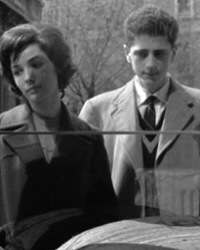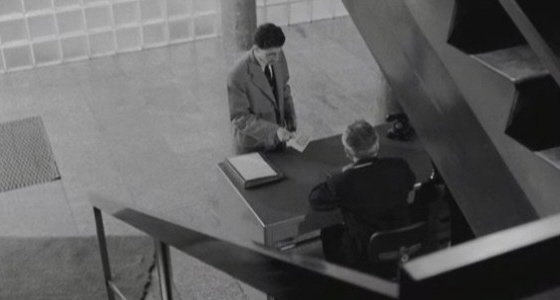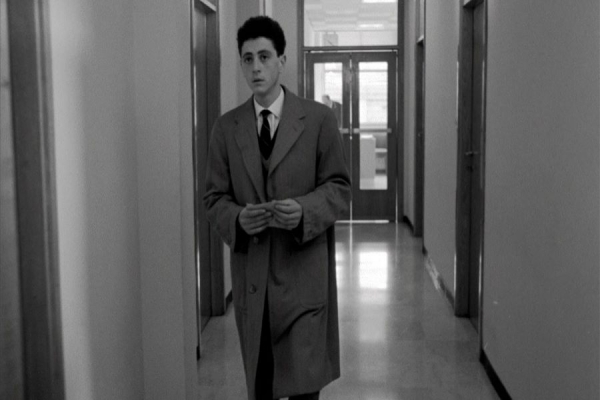Il Posto
Written by Matteo Sedazzari
In 1961 Italy was rebuilding her economy after the Second World War, like a lot of Western Europe, and with Milan seen as a beacon of hope due to their upturn in manufacturing, opportunities were being created and companies were crying out for young blood.
With this new philosophy of buoyancy and what has been labelled the Italian economic miracle (Il Miracolo Economico), it is only right that this progress should be captured on film, and this is the case with Il Posto.
Il Posto falls under the category of Italian neo-realism, drama documentary-style films, made on location with naturalistic settings and no elaborate sets. Stories centering around poverty, with the Italian poor or working class as the central characters. Many of the directors would use non-professional actors to maintain a strong level of everyday life. The filmmakers wanted the audience to see themselves.
Il Posto starts with no music, just Domenico Cantoni (Sandro Panseri) trying to get to sleep before an important job interview. Straight away the viewer knows that Domenico does not come from a wealthy family, as his bed is in the kitchen. With his mother shouting for him to get to sleep, and his brother entering the kitchen, Domenico is yearning for some peace and quiet as he has to sleep before his first ever job interview at a major company in Milan. Yet there seems to be no fear, no excitement other than he has to do it.
The following morning Domenico, along with another ten to twenty candidates, goes through a number of bizarre tests, medical and questionnaires to land a bottom of the ladder job. When Domenico is informed by the larger-than-life boss that he has been successful with his application he shows no joy other than acceptance.  The overall setting for the film is bleak and rather reminiscent of harsh and cold days in February, and against this rather depressing backdrop, splendour is found by beautiful overcoats, suits, and dresses that are worn by the young members of the cast. On seeing the original Italian clothes in 1961, it is little wonder that the working class of Great Britain had a strong desire for these suits as they wanted to look as sharp and stylish as the Italians did in Il Posto.
The overall setting for the film is bleak and rather reminiscent of harsh and cold days in February, and against this rather depressing backdrop, splendour is found by beautiful overcoats, suits, and dresses that are worn by the young members of the cast. On seeing the original Italian clothes in 1961, it is little wonder that the working class of Great Britain had a strong desire for these suits as they wanted to look as sharp and stylish as the Italians did in Il Posto.
Panseri is a talented actor, and this was his first role. Moreover, he only made two more films after Il Posto, and after 1965 his short and brief career in acting was over. However with Domenico, he creates a character that accepts circumstances and is happy to swim with the tide in life, he has no real ambition other than what he is given. Sometimes rather suggestive of Buster Keaton with his pained facial expressions. The only thing that inspires him is Antonietta Masetti (Loredana Detto) an attractive girl with an upbeat personality, who he met on the day of the interview, and like Domenico, she too was successful in her application.
Antonietta and Domenico do converse, even have a coffee together, yet due to Domenico’s naturally shy way and lack of determination, any possible relationship falls by the wayside. But sometimes it is not all Domenico’s doing, as Antonietta says she will be at the New Year’s Eve office party, he turns up dressed to the nines, only to be stood up, so therefore he gets drunk with his work colleagues. Let’s be honest, we have all been there.
What makes this incident with Il Posto interesting, and enables the viewer to feel empathy, is that the story is only seen from Domenico’s point of view, we never know why Antonietta failed to show, and isn’t that so much like real life, we only ever see or understand our version of events.
Like Panseri, Detto did not follow a career into acting, but she did marry the director Ermanno Olmi, who began his career as a director in 1951 and to date, his last film was in 2011. So I am sure that Detto is highly knowledgeable and still involved in her husband’s career, as they are still married today.
Even though the film is naturalistic, symbols of authority like the boss, his secretary, the post room man are caricatures of power, and the interior shots of the office, the dining area, and halls are made to look vast, so the people within the shots seem small and powerless against the bricks and mortar of the working world. 
Il Posto is a good film on all levels, for the plot, the era, the clothes, the country, the message, cinematography, the actors, and humour. I do believe most people would be able to see some aspect of their life with the film, even though they would hate to admit it and you will find yourself at the end, wondering if sometimes the first choice you are given at work, is the best choice. And to me, that is what makes Il Posto more than a good film, but a great film, it makes you question decisions you have made or are going to make.
Matteo Sedazzari
Latest from Matteo Sedazzari









